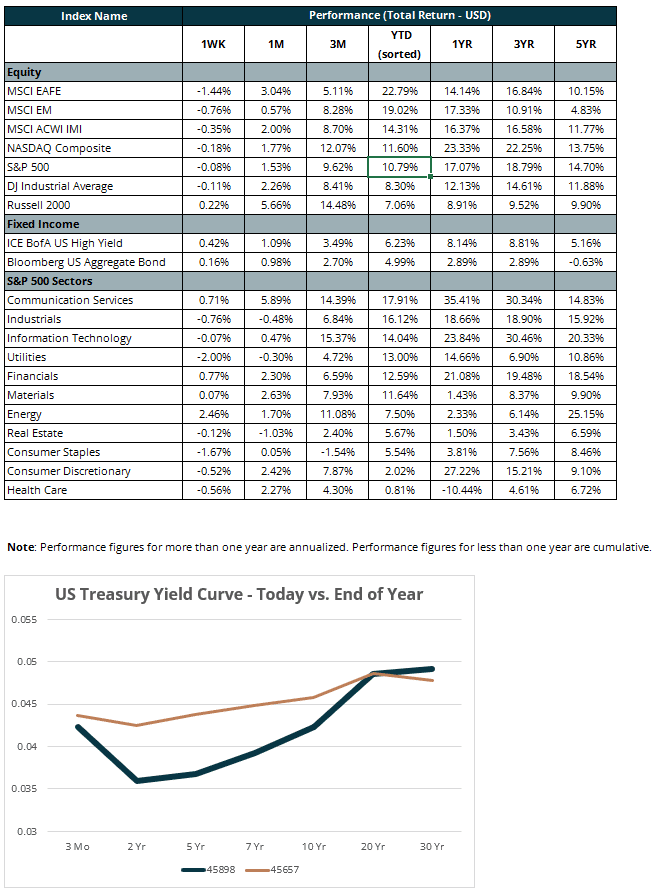NVIDIA’s Earnings Cause Indigestion for AI Stocks

by Sequoia Financial Group

by Sequoia Financial Group
NVIDIA (NVDA), the most valuable public company in the world, reported earnings after Wednesday’s close. Though overall expectations were exceeded, data center revenue of $41.1B missed forecasts of $41.3B. As a result, NVDA declined 4.1% through the end of Friday’s trading. NVDA has been a bellwether for the AI boom, owing to the company’s graphic processing unit (GPU) chips. Data centers host AI infrastructure utilizing these GPUs and serve as middlemen to “hyperscalers” such as Meta Platforms (META) and Amazon.com (AMZN). A possible slowdown in NVIDIA’s data center revenue could indicate that AI projects are not generating anticipated returns on investment. In fact, data center revenue growth of 56% was the slowest rate in the past 9 quarters. META and AMZN slid on Friday by 1.7% and 1.1%, respectively.
The Bureau of Economic Analysis released the Personal Consumption Expenditures (PCE) price index on Friday, adding to the week’s headwinds. Core PCE, which excludes volatile food and energy prices, rose 2.9% year over year in July. The print was higher than the prior month’s 2.8% reading and in line with levels registered in February 2024. Economists expected this result, so interest rates moved only modestly. In fact, the 2-year US Treasury rate ended the week lower by ~0.1%. The Bloomberg US Aggregate Bond Index returned 0.2% over the week, bringing year-to-date returns to 5%.
The higher inflation reading exacerbates concerns the Federal Reserve could become captive to the President’s political agenda. On several occasions, the President has urged Fed Chairman Jerome Powell to cut interest rates. The President recently announced he was firing Lisa Cook, one of twelve Federal Reserve governors, because of alleged mortgage fraud. Cook announced last week that she was suing to retain her job.
The Federal Reserve’s independence to implement monetary policy provides credibility in controlling inflation expectations. For example, if workers doubt the Federal Reserve will bring down inflation, they are more likely to demand wage increases. Such increases could lead to higher goods and services inflation. This scenario played out in the late 1960s-early 1970s, when President Nixon exerted political pressure on then Fed Chairman Arthur Burns to keep interest rates low. Economic historians credit the high inflation that ensued to the lack of Fed independence. Core PCE inflation reached as high as 10.2% in 1975 and didn’t dip below 5% until 1983.
Financial markets will continue to monitor the persistence of inflation above the Fed’s 2% target. CPI and PPI for August will be reported during the week of September 8.

The views expressed represent the opinion of Sequoia Financial Group. The views are subject to change and are not intended as a forecast or guarantee of future results. This material is for informational purposes only. It does not constitute investment advice and is not intended as an endorsement of any specific investment. Stated information is derived from proprietary and nonproprietary sources that have not been independently verified for accuracy or completeness. While Sequoia believes the information to be accurate and reliable, we do not claim or have responsibility for its completeness, accuracy, or reliability. Statements of future expectations, estimates, projections, and other forward-looking statements are based on available information and Sequoia’s view as of the time of these statements. Accordingly, such statements are inherently speculative as they are based on assumptions that may involve known and unknown risks and uncertainties. Actual results, performance or events may differ materially from those expressed or implied in such statements. Investing in equity securities involves risks, including the potential loss of principal. While equities may offer the potential for greater long-term growth than most debt securities, they generally have higher volatility. Past performance is not an indication of future results. Investment advisory services offered through Sequoia Financial Advisors, LLC, an SEC Registered Investment Advisor. Registration as an investment advisor does not imply a certain level of skill or training.









Fed Rate Cut Pushes Stock Benchmarks to Fresh Highs